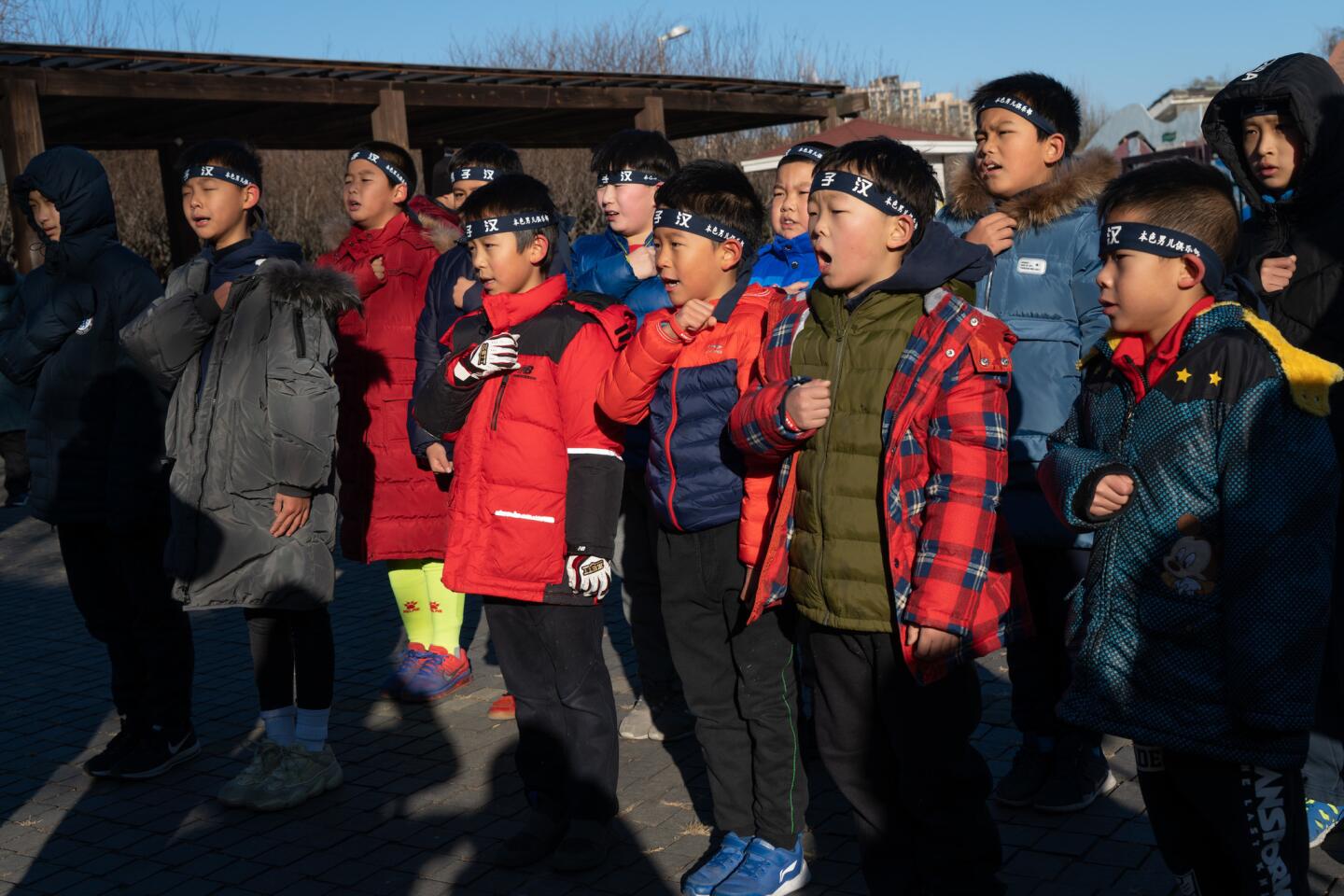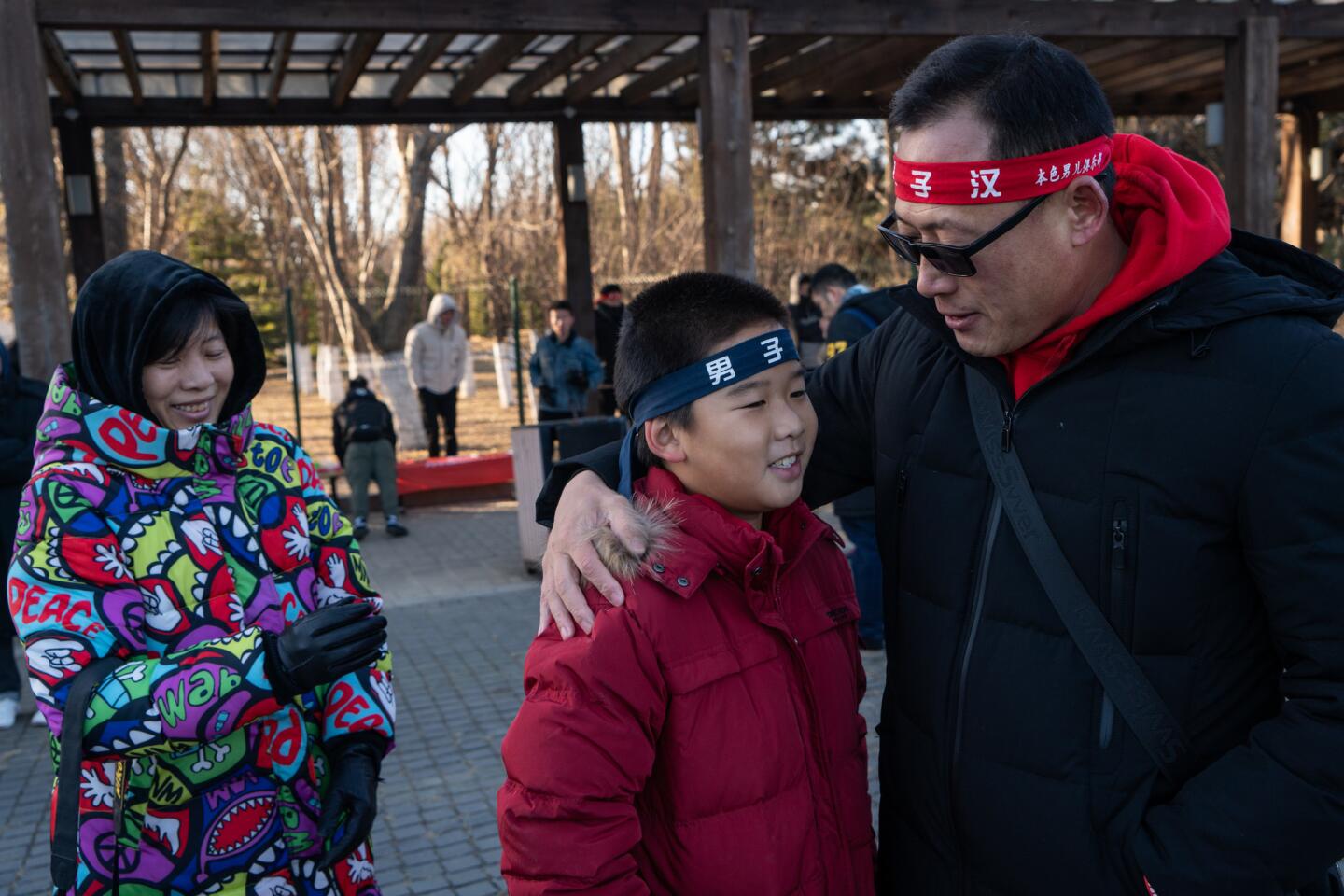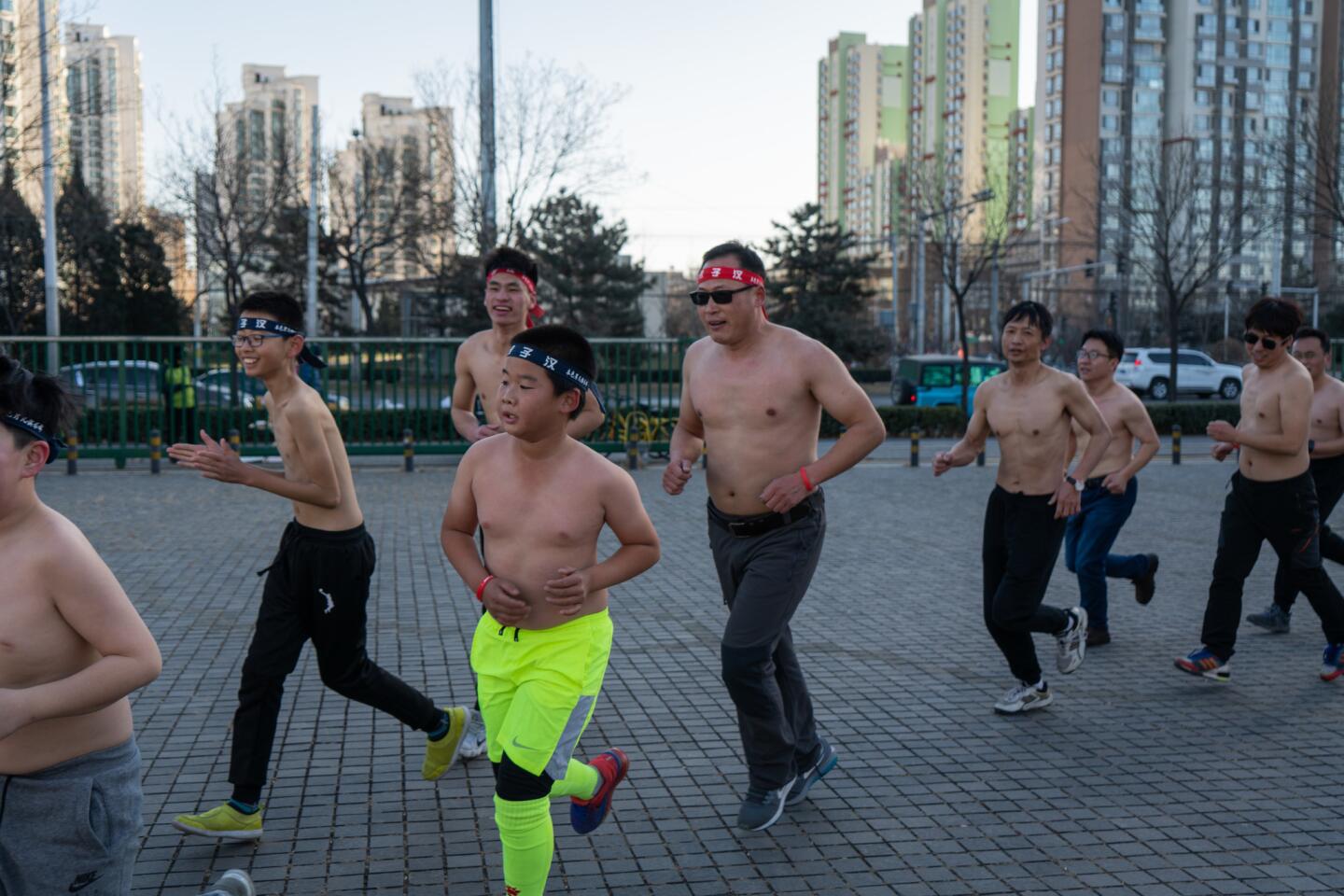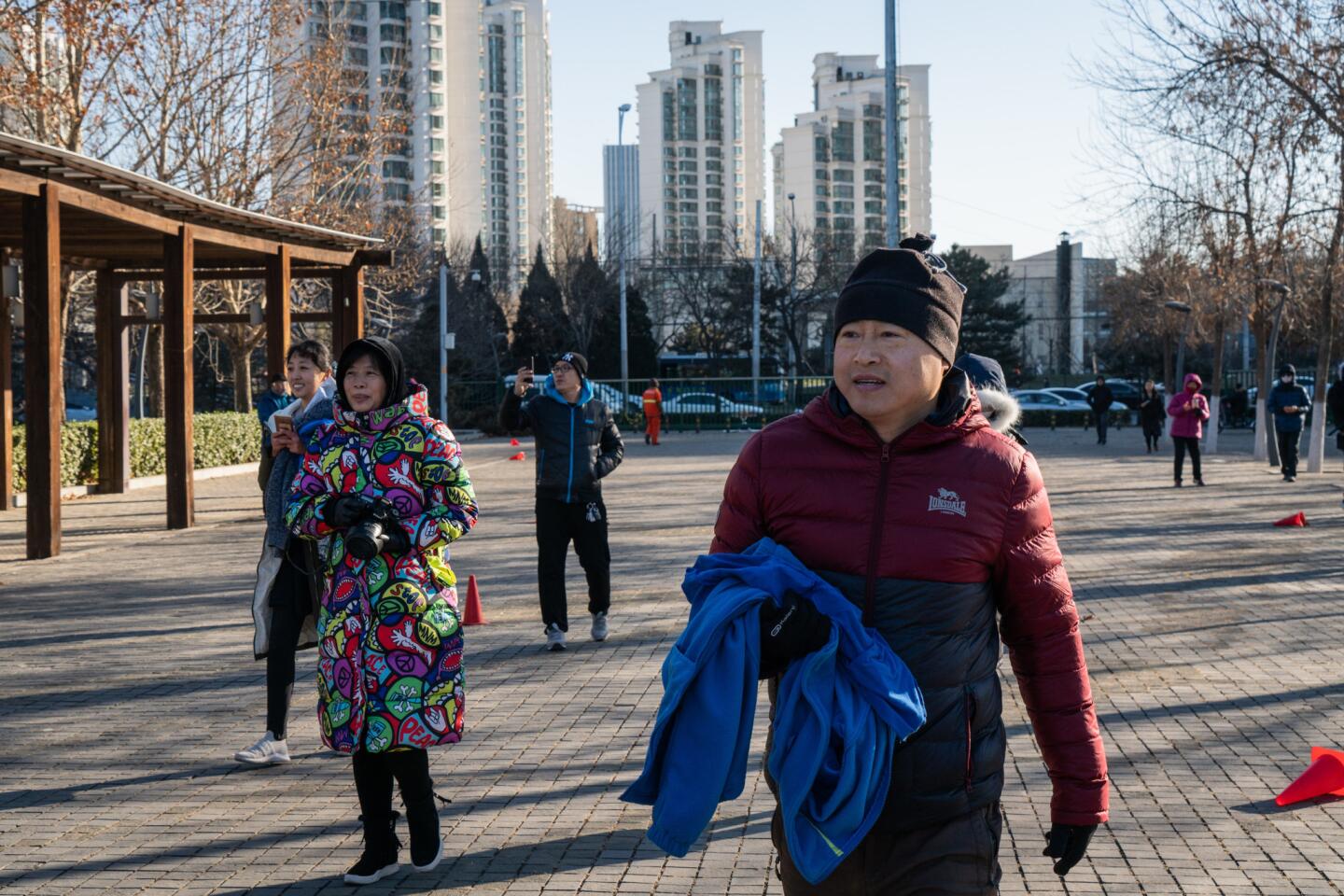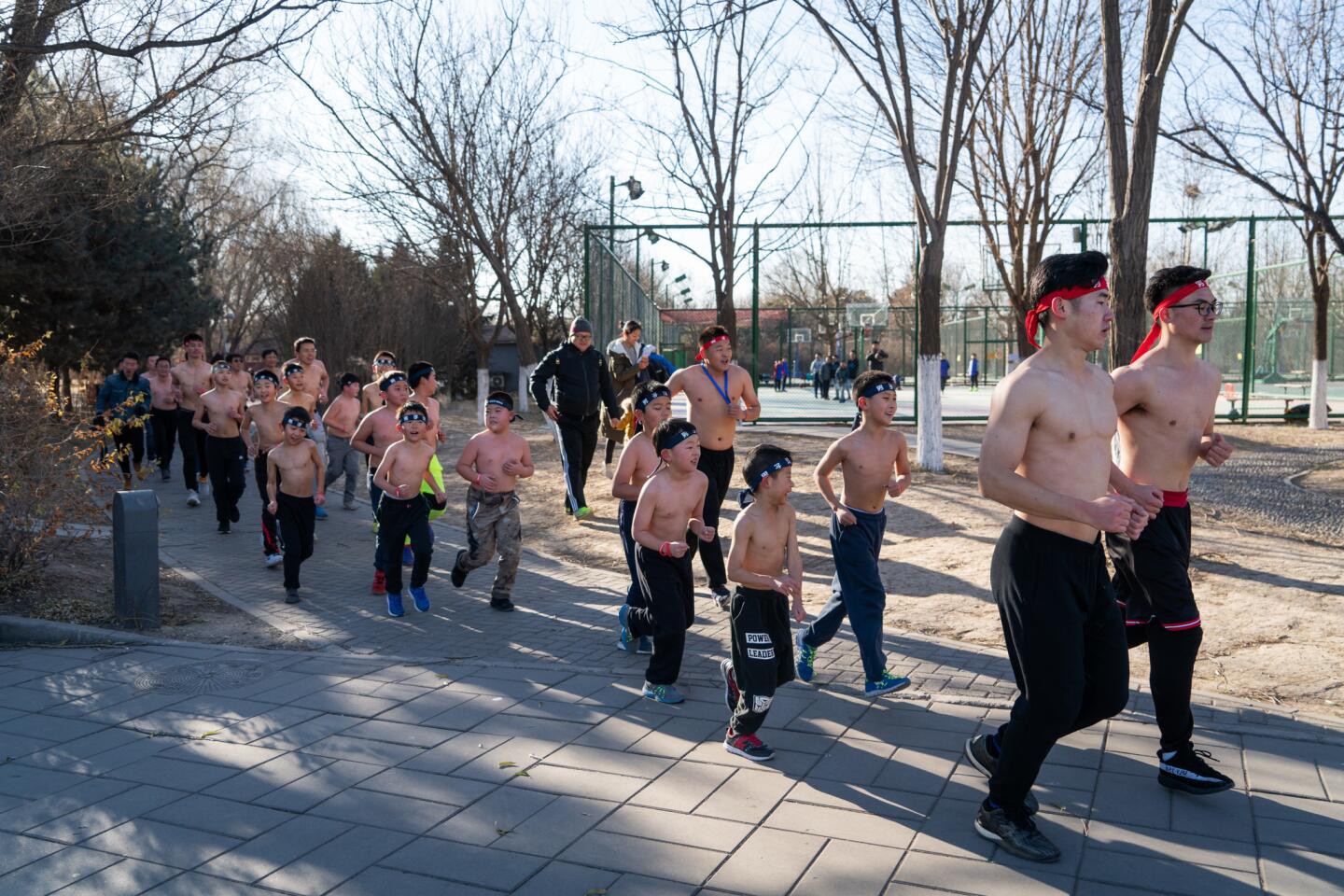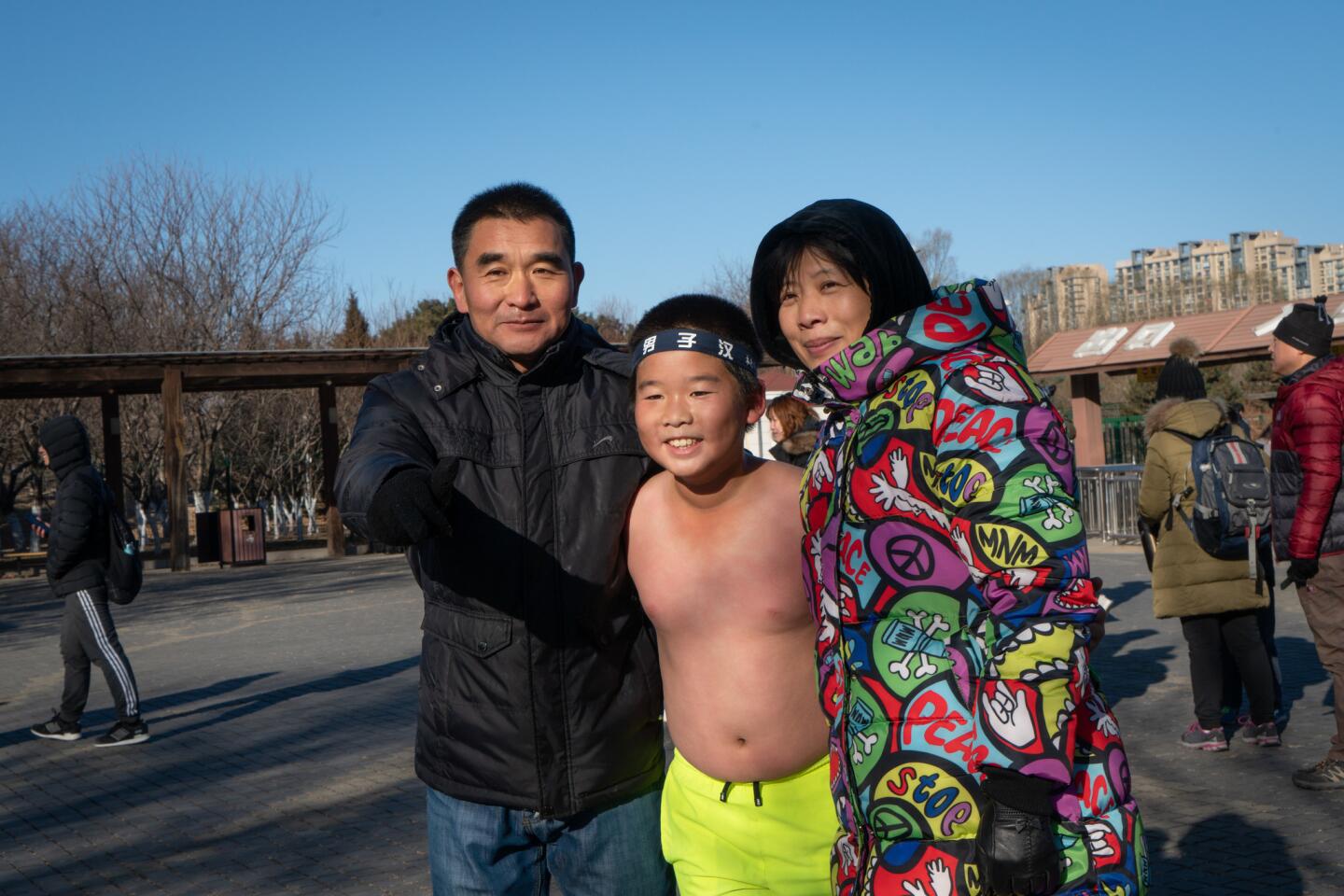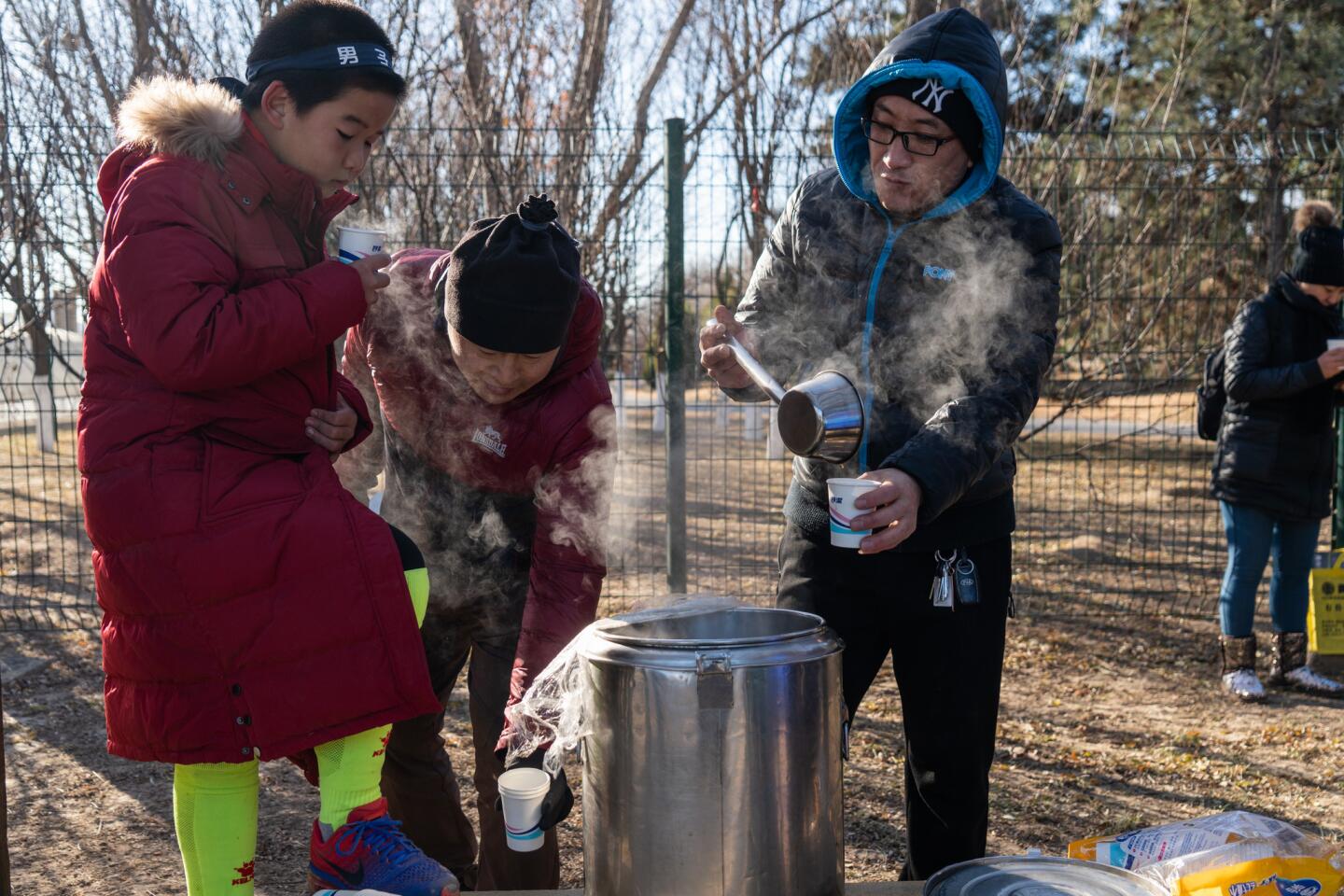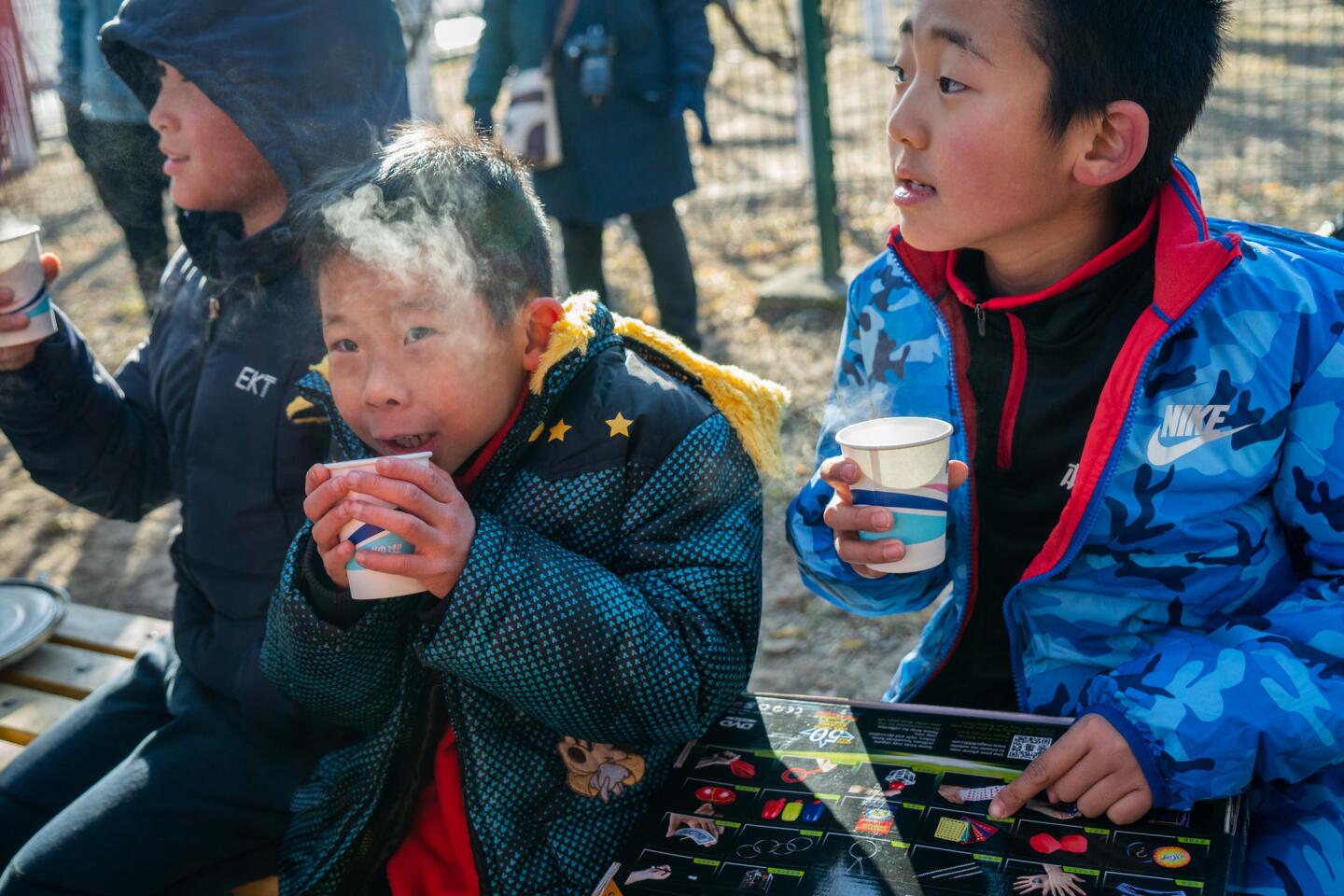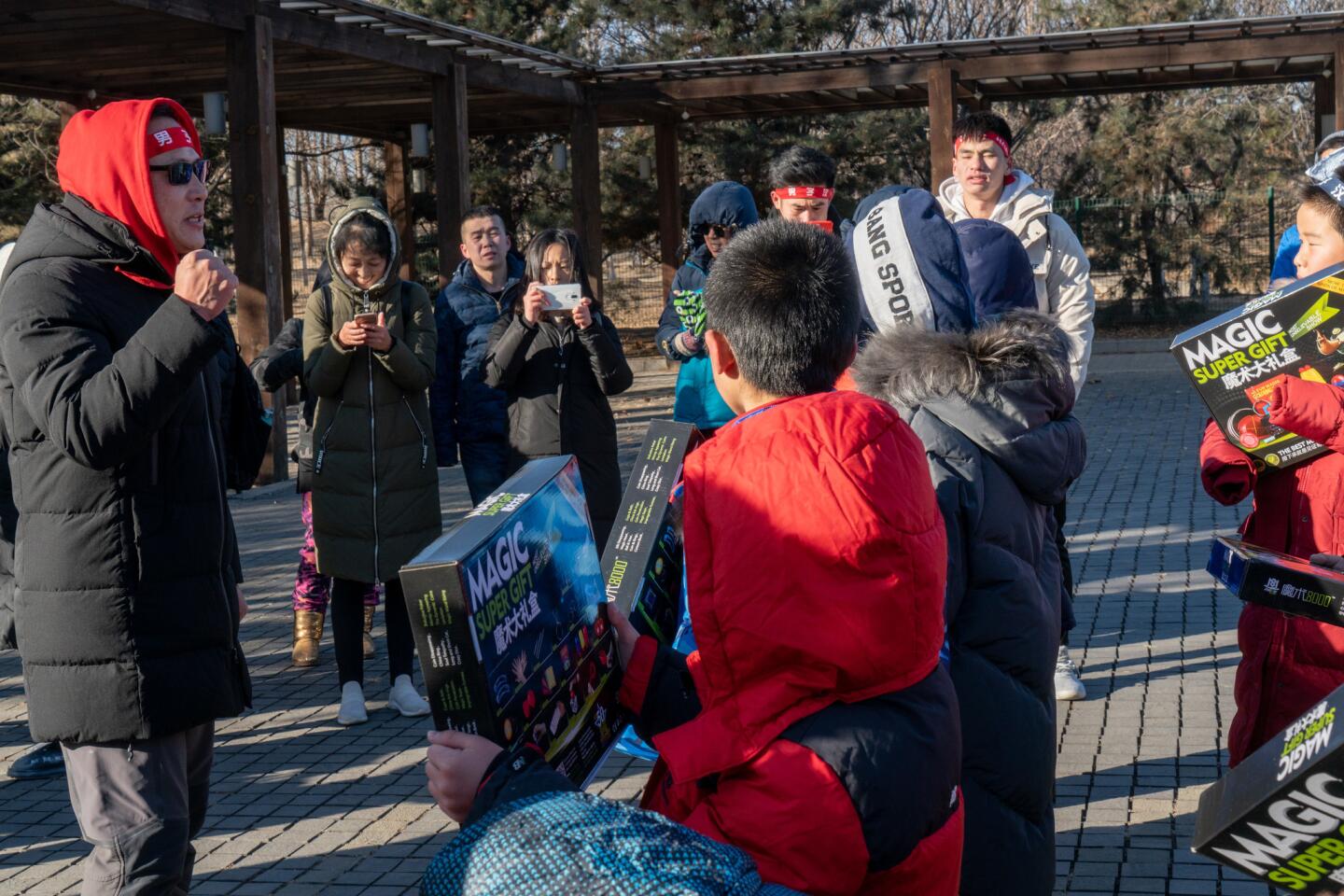To fight K-pop’s influence in China, a club teaches young boys to be alpha males
Reporting from Beijing, China — It is 14 degrees the morning two dozen boys gather at a Beijing park to be transformed into alpha males. A reluctant winter sun casts silver light between treacherously cold shadows. The wind bites, worsening nerves as the boys — the youngest 7 — prepare to strip to their waists for a run.
One of the watching mothers is worried. She wants her son to grow into a macho male, but it’s so cold. She tells him he can keep his shirt on, or perhaps skip the run through Olympic Forest Park.
This is the kind of “feminine” parenting that coach Tang Haiyan fears can ruin boys. Tang, a former schoolteacher, founded the Real Man Training Club to combat what he and others in China see as a masculinity crisis — part of a backlash against the makeup- and earring-wearing male TV, film and pop idols who have gained immense popularity here.
“If you are promoting these effeminate figures,” Tang said, “it’s a calamity for our country.”
In a nation where men dominate political and business leadership and campaigns for gender equality have gained little traction, the debate over what is “effeminate” has become a popular pastime among older conservative residents, and mostly among men.
Influenced by K-pop idols in Korea, China’s boy bands and celebrities — with their delicate beauty, dyed hair and haute couture wardrobes — have a massive following among women here. But China’s state-run media condemns the young idols, calling them “sissy pants” and “fresh young meat.”
The backlash deepened after a back-to-school TV program featured the boy band F4. Angry parents attacked the Education Ministry’s decision to hold up the cosmetics-wearing young men as role models; state media warned that a “sick” and “decadent” culture threatened the future of the nation. This year, a Chinese videostreaming website started blurring earrings worn by men.
“The gender stereotyping is not just about gender identity itself,” said an author and researcher on Chinese masculinity. “It’s about the reproduction of the nation and how to properly cultivate the next generation.”
Song Geng of the University of Hong Kong said the fear partly reflects deep-seated insecurity about Chinese power, after historical humiliations such as the opium wars and domination of Chinese rulers by foreign imperial powers.
“They’re worrying that if Chinese men are so effeminate… then we will become a weak country in future and we cannot compete with our rivals,” he said. “There’s anxiety about the virility of the nation being harmed by those effeminate male images.”
Screenwriter Wang Hailin says the young men resemble male prostitutes sought after by some affluent older women. “We need to be aware of this effeminacy before it’s too late and deal with it,” said Wang, 48.
He has berated fellow screenwriters, saying they portray men as “wimps, cowards, losers and idiots” and that China should look to Hollywood for strong alpha male characters.
“It’s created the impression that Chinese men are all weak, irresponsible and indifferent,” he warned. “Male actors represent national ideology. We cannot encourage the younger generation to look up to them as role models.”
Chinese military leaders seem to share fears about the nation’s men, with the army newspaper People’s Liberation Army Daily complaining that 20% of recruits were not fit enough to pass the fitness test for admission because they were overweight, watched too many cellphone videos, drank too much or masturbated too often.
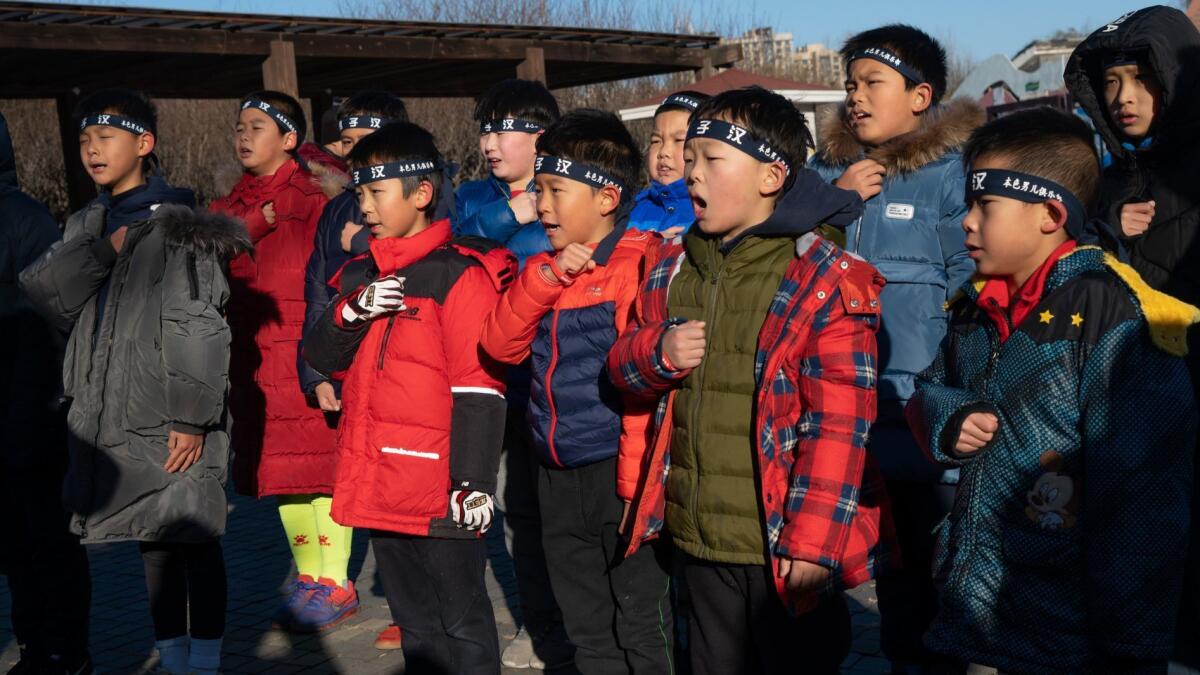
‘Reserve for alpha males’
Tang likens his club to a “reserve for alpha males.”
On the morning of the shirtless run, the boys arrive clad in down jackets, but one by one the layers come off. Each boy dons a headband with the words “Real Man.” Their track suits and shirts display slogans in English such as “Power Leader” and “Anything is Possible.”
Tang and other male mentors lead the boys in chest beating and slogan shouting.
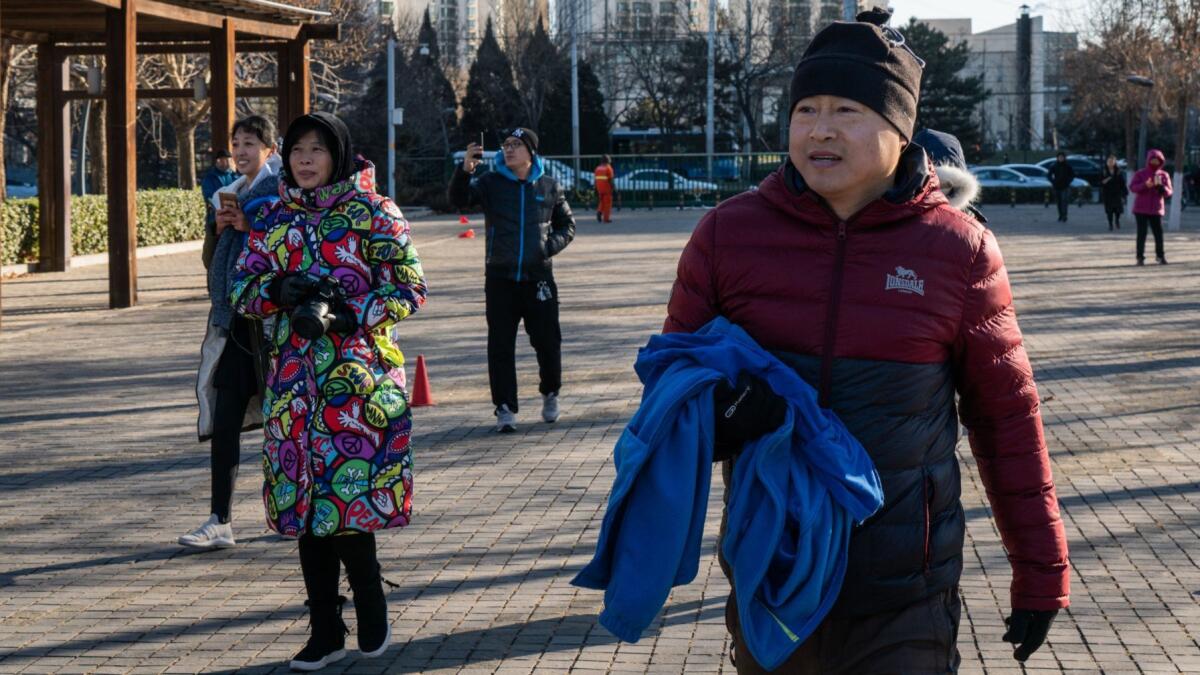
Huddling nearby, parents — mainly mothers — shuffle from one foot to another as if to dance the cold away, taking cellphone photos of their sons. They say the boys chose to take part in the club, which offers weekly activities including American football, wrestling and boxing, and annual treks through the desert and mountains.
The boys box the air and run in place; a few look self-conscious, their movements slow and awkward. The boy whose mother said he could skip the run is with them. In this club, boys who cry are ignored; for the 11-year-old, opting out would have brought a monumental loss of face.
“I think it’s a good opportunity for him to gradually cultivate a macho character,” said his mother, who gave her surname as Chen. She described her son as shy and introverted and said participating in outdoor camps boosts his confidence.
China may be ready to drop limits on child-bearing, but the pain of its one-child policy endures »
“If you are a male, you are supposed to have those male traits. If you are a girl, you tend to be softer,” Chen said. “But I don’t think the entertainment industry has shown good role models for the society because the celebrities they put on the big screen exhibit a more feminine side of men. That’s the problem.”
‘A delicate face does not mean a weak heart’
Li Chao, 21, lives in an plush outer-Beijing apartment with two assistants and a brown toy poodle named Coffee. He is the kind of man many conservatives despise. His hair is artfully mussed, and he wears a subtle rose shade on his eyelids, a natural lipstick and pale foundation. He makes $30,000 a month live-streaming himself applying makeup, an extraordinary sum for a young man without a degree.
At school, troubled by pimples, it bothered him that boys were not supposed to care about their appearance. He got himself some concealer and started asking girls how to apply makeup.
“I felt delighted because every day I would wear makeup, and I felt really fresh and really great,” he said. ”It put me in a good mood.”
His father was horrified.
“He would get angry, and he would question me. He said you should not do girlie things. You should not look like a girl,” Li said. “He’d say: ‘Stop wearing that. Stop it. You should go outside and play sports.’
“I’ll never change him.”
To avoid arguments, Li applies cosmetics with a light hand when he visits his parents, but he rejects the attacks in state media and by conservatives. He hates some of the posts on his blog, such as one telling him the only color men should wear is camouflage.
“The whole premise of those comments is to judge someone based on their appearance,” he says. “But in modern society, you can’t judge us for not looking masculine enough. How do you know we are not masculine enough?”
Other Chinese men are also increasingly using cosmetics and facial products. A taxi driver in the eastern city of Linhai faced internet notoriety when photos of him driving while wearing a moisturizing skin mask went viral last year. Chen Yiqun was suspended from work for three days and was the butt of social media jokes, but he also found fans online who applauded his facial regimen.
“What’s wrong with having a much more diverse image of men?” Li asked. “It’s common these days for men to care about their appearance.”
Li has 1.5 million followers on the video-streaming site Kuaishou and 2 million on the social media site Weibo, mostly girls and women, from 12 to 30.
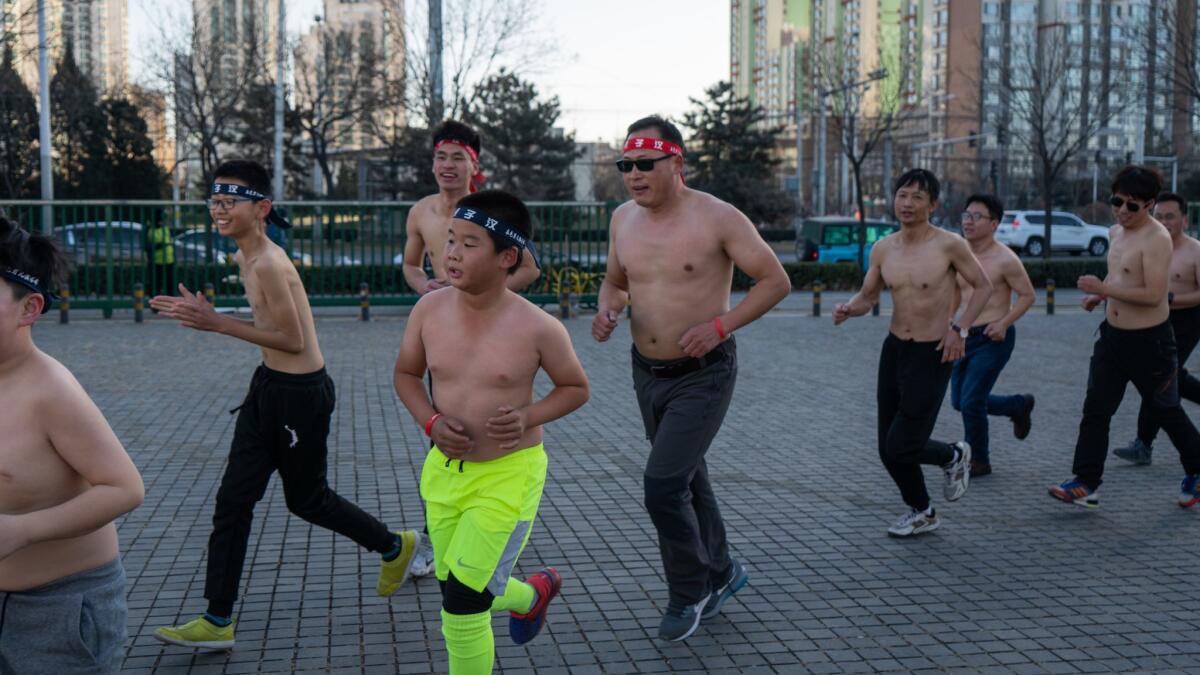
He waded into the debate on Weibo after the controversial back-to-school TV program, with many sharing his views: “We should create a tolerant and diverse society. Men should focus on having an independent soul, a righteous heart and a strong sense of social responsibility.”
Researcher Zheng Jiawen from Nanjing University’s School of Journalism and Communications contends that “China’s real crisis of masculinity isn’t ‘sissy pants.’
“It’s a generation of men anxious and insecure about their declining social status and their desperation to cling to power,” Zheng wrote on the Shanghai-based website Sixth Tone.
“We must all learn to accept the fact that a delicate face does not mean a weak heart, slender shoulders do not reveal a fragile soul, and a ‘betrayal’ of outdated masculine stereotypes is not a betrayal of the nation.”
In China, tattoos border on illegal — and they’re his life’s work »
World view divided by gender roles
Tang, who founded Real Man Training Club in 2012, has a world view that is divided into traditional gender roles: Boys are rough, boisterous and energetic. Girls are quiet, studious and groomed.
The former school teacher, whose class included troubled, low-achieving boys, said Chinese boys are betrayed by an education system dominated by risk-averse female teachers who reward girls’ “good” behavior and punish “bad” male behavior.
Dirt-poor and ugly — the proud new mantra of those left behind in the new China »
Tang designed the club — which he says fluctuates between 2,000 and 3,000 members — to get boys to face tough physical challenges “in a manly way,” which he defines as being brave, responsible and committed.
He said he was inspired by his love of American football and a visit to California in 2006 to see how teams were trained. He came away with the idea that U.S. parents wanted their sons to play football “so they could become alpha males.” He decided the sport could transform Chinese boys.
‘We are real men’
Beijing’s watery sunshine does nothing to take the bite out of the morning air, but it’s time for the boys to strip off their shirts. They hand them to their mothers, giggling and bouncing about, arms huddled to their chests, as their parents whip out phones for more photos.
The boys form into two military-style lines and run for about 10 minutes around the park. They run stoically, in lockstep with their coaches, as the low morning sun paints their long shadows on the ground:
“One, two, three!
“Who’s the best?
“We are!
“Who are we?
“We are real men!”
Gaochao Zhang of the Times’ Beijing bureau contributed to this story.
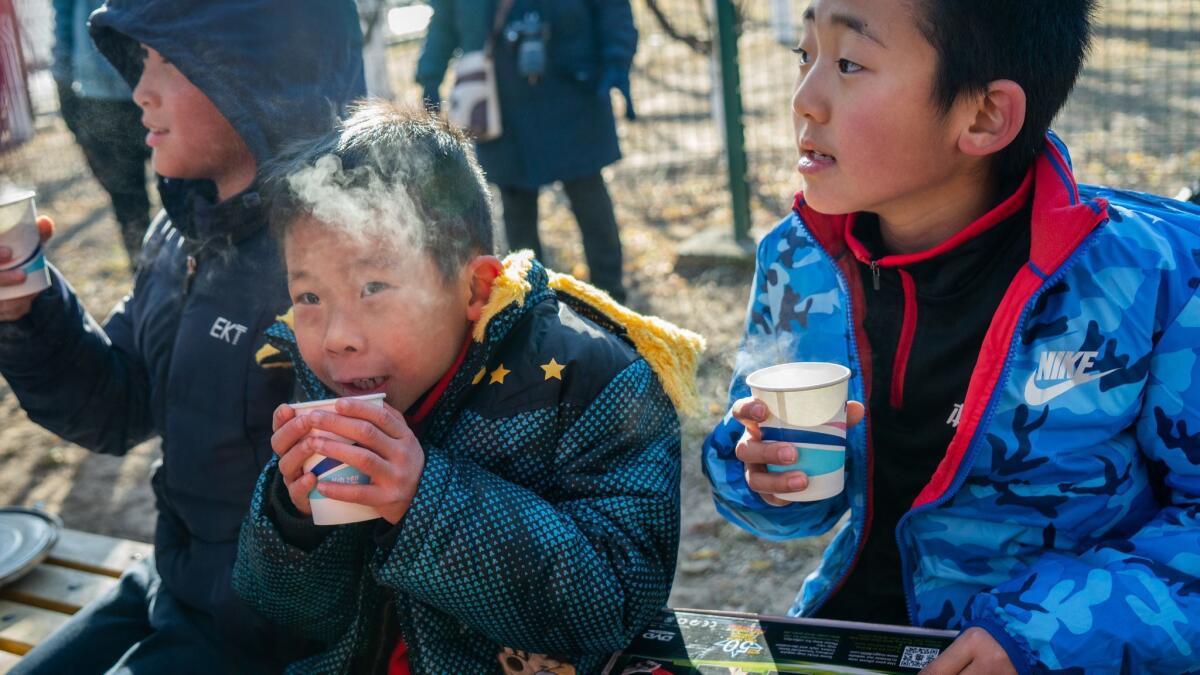
Twitter: @RobynDixon_LAT
More to Read
Sign up for Essential California
The most important California stories and recommendations in your inbox every morning.
You may occasionally receive promotional content from the Los Angeles Times.
